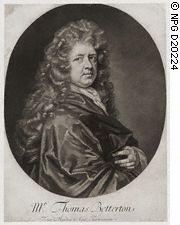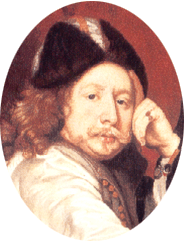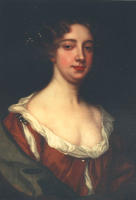1640 -- Birth of Aphra Johnson, second daughter of Bartholomew Johnson and Elizabeth Denham, baptized Dec. 14 at Harbledown outside of Canterbury. (Although there has been much controversy over the circumstances of Behn's birth, this appears to be the most likely candidate.)
1663-64 -- Probable period of residence in Surinam.
1664 -- Possible date for marriage to Mr. Behn, merchant of "Dutch" (German) extraction.
1665 -- Death of Mr. Behn?
1667-67 -- Aphra Behn serves in Antwerp as a spy for Charles II.
1668 -- Sent to debtor's prison for debts she incurred in the service of the crown. Probably released shortly thereafter.
1670 --

Production of Behn's first play, The Forced Marriage, at Lincoln's Inn Fields by the Duke's Company. It was a great success and ran for six nights, providing its author with two nights' income. (The "third day" always belonged to the author of the play.)
1671 -- February - The Amourous Prince (published 1671); Dorset Garden Theater opened.
1672 -- Covent Garden Drollery published, probably edited by Behn.
1673 -- The Dutch Lover produced at Dorset Garden Theater; does not hold the stage until the third day (not published until 1677).
(The Duke's Theatre, Dorset Garden)
1675 -- Possible plays by Behn: The Revenge: Or a Match in Newgate, and The Woman Turned Bully.
1676 -- Behn's only tragedy, Abdelazer, produced in the summer. It was followed a few months later by The Town Fop (both published 1677).
1677 -- The Rover, perhaps Behn's most successful play, produced in March and published the same year. Nell Gwyn returned to the stage to play the role of the whore Angelica Bianca.
(Nell Gwyn)
Two further plays produced at Dorset Garden attributed to Behn, The Debauchee (February) and The Counterfeit Bridegroom (September).
1678 -- Sir Patient Fancy produced in January (published 1678). Nell Gwyn once again took a role, that of Lady Knowell.
1679 -- The Feigned Courtesans, dedicated to Nell Gwyn, produced in the spring at Dorset Garden (published 1679) and the tragi-comedy The Young King in the fall (published 1683).
1681 -- The Second Part of The Rover produced early in the year (published 1681), The False Count in November and The Roundheads in December (both published 1682).
1682 -- The City Heiress produced in the spring, (published 1682) followed by Like Father, Like Son, which was such a failure that it was never published and has since been lost. Behn arrested for an "abusive" prologue, but probably let off with a warning. Merger of the the King's Company and the Duke's Company (where Behn's plays were produced) to form the United Company.
1683 -- Publication of the first part of Love Letters Between a Nobleman and His Sister, an epistolary roman à clef, the first major epistolary novel in English literature.
1684 -- Behn's Poems on Several Occasions published.
1685 -- Another collection of poems, Miscellany, published. Death of Charles II; accession of his brother James II.
1686 -- Publication of The Lover's Watch. The Lucky Chance, Behn's first play since the failure of Like Father Like Son, produced at Drury Lane
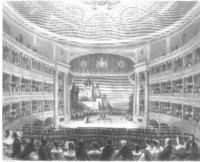
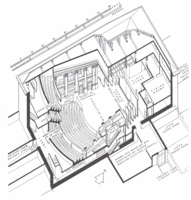 (The Theatre Royal, Drury Lane)
(The Theatre Royal, Drury Lane)>
(Inside View)1687 -- Her farce The Emperor of the Moon produced in March and published the same year.
1688 -- Three prose fiction works by Behn published: The Fair Jilt, Agnes de Castro and her most famous work, Oroonoko. Abdication of James II ("Glorious Revolution").
1689 -- Death of Aphra Behn, April 16. Buried in Westminster Abbey. Two of her plays produced posthumously: The Widow Ranter (1689 - epilogue by John Dryden) and The Younger Brother (1696).
(Westminter Abbey)



